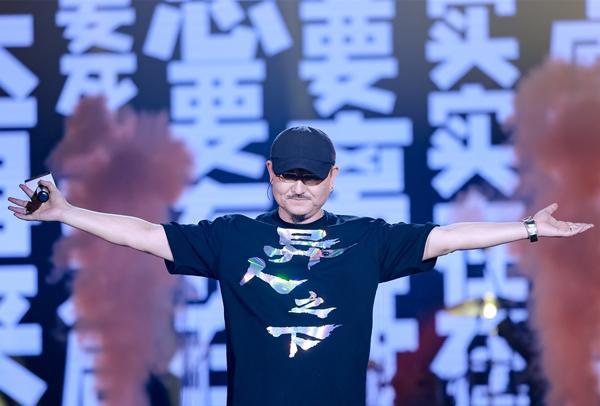
 0 Comment(s)
0 Comment(s) Print
Print E-mail China Daily, August 8, 2024
E-mail China Daily, August 8, 2024

Director Wuershan poses on stage at the premiere gala for "The Traveller" held in Beijing, July 22, 2024. [Photo courtesy of Dark Horse Entertainment]
At a young age, film director Wuershan was enchanted by the storied world of Chinese martial artists, once dreaming of traveling to the Shaolin Temple in Henan province to learn the art of kung fu.
Although he never took the journey, the 52-year-old filmmaker has found a way to infuse his enthusiasm for martial arts into his cinematic creations.
Wuershan's latest directorial effort The Traveller continues the director's trademark of showcasing traditional Chinese culture in fantasy tales, as demonstrated in his previous blockbusters Painted Skin: The Resurrection (2011), Mojin: The Lost Legend (2015) and Creation of the Gods I: Kingdom of Storms (2023).
Featuring an ensemble cast, including actors Hu Xianxu and Feng Shaofeng and actress Vanda Li, the film was released in domestic theaters on July 26.
Dressed in a black T-shirt featuring the film's shining Chinese characters on the chest, the talkative director shares with China Daily his attraction to directing the new movie adapted from comic artist Mi Er's bestselling work The Outcast.
It was a summer day in 2020 when Wuershan's producer handed him the comic books recommended by Tencent Animation and Comics, a website of the internet giant that serialized The Outcast beginning in 2015.
Like Hollywood superhero films created by Marvel or DC, The Outcast offers a Chinese twist, fictionalizing a group of legendary individuals with superpowers who must conceal their talents by blending in as ordinary people in the ordinary world.
Zhang Chulan, the story's protagonist, is a sophomore college student who comes across as slick, yet somewhat timid. However, he is the inheritor of a powerful family lineage with supernatural abilities. Assisted by Feng Baobao, an immortal young woman with a mysterious past, Zhang unravels the truth behind his grandfather's death and confronts a group of villains scheming to steal his superpower for their own nefarious purposes.
Soaring as a phenomenal hit in the comic and animation circles, The Outcast — which has published over 680 episodes across five seasons — has amassed over 30 billion views online and has been adapted into various projects, including online games, animated series and a 27-episode live-action drama.
"When I watched the first episode, I was immediately hooked. I couldn't resist binge-watching the entire second season right away. The world and characters are just so captivating," recalls Wuershan.
"In Hollywood, there's a long history of movies based on comics, but in China, this genre is still relatively rare. With The Traveller, I hope to fill this gap and introduce Chinese superheroes tailored for Chinese viewers," he adds.
Then involved in the production of the Creation of the Gods trilogy, where three installments were filmed one-by-one but planned for separate releases in subsequent years, Wuershan was cultivating a bold and innovative concept.
Creation of the Gods is adapted from Fengshen Yanyi (The Investiture of the Gods), a 16th-century novel set during the tumultuous decline of the Shang Dynasty (c. 16th century-11th century BC). The story weaves together historical figures, such as King Zhou, with mythological characters like Nezha, crafting a world where humans and celestial beings coexist.
Inspired by the novel, the director once considered developing a screenplay that would re-imagine the young warriors — some with superpowers — from Fengshen Yanyi as modern-day university students. He even toyed with the idea of naming this institution "Fengshen Yanyi Academy".
"I have always wished to produce a film centering on young heroes who possess superpowers and master excellent martial arts skills but live in modern society. I once planned to write such a story. But after I read The Outcast, I thought, 'It's a very mature, well-developed and amazing work.' So, I quickly abandoned my idea and shifted to The Traveller film," he says.
In early 2021, the film launched a nationwide casting campaign, auditioning over 1,000 candidates and selecting three finalists for each character. These finalists underwent months of rigorous training, which included learning martial arts skills such as tai chi and shequan (snake fists), as well as performance techniques.
Those who ultimately secured the roles underwent specific training to fully embody their characters. Actor Hu, portraying the protagonist Zhang, had to practice talk show techniques as his character is talkative and slick. Actress Li underwent training to speak minimally within a month as her character Feng is a powerful fighter of few words.
"For these young actors, the strict training schedule of six days a week is a crucial experience because the characters they portray have undergone strict training since childhood to master combat with superpowers," explains Wuershan. "The challenges that the actors experience during training mirror those faced by the characters, helping them better understand their roles."
With the movie blending Eastern aesthetics with dynamic action sequences to craft narratives deeply rooted in Chinese culture, the director reveals that he also integrated the film with traditional philosophical thoughts, such as the naturalism ideas from Yang Zhu, a prominent philosopher of the Warring States Period (475-221 BC).
It also incorporates the profound wisdom of Bruce Lee, encapsulated in the action giant's iconic phrase "Be water, my friend", and showcases Lee's distinctive martial arts philosophy of Jeet Kune Do.
As the summer box-office season enters its third month, the film has become one of the most discussed blockbusters online, contributing to the recovery of the Chinese film industry, note insiders.
Go to Forum >>0 Comment(s)